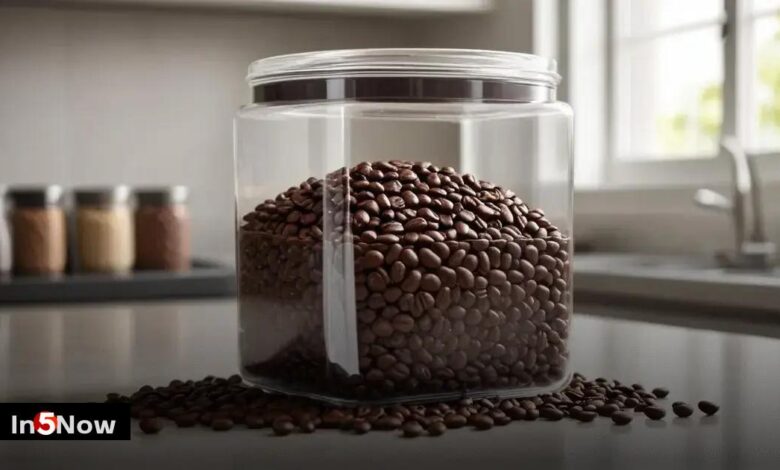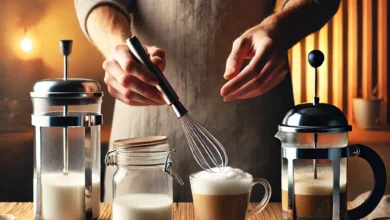How to Store Coffee Beans for Maximum Freshness

To store coffee beans for maximum freshness, keep them in an airtight container away from light, heat, and moisture. Use whole beans within two to four weeks after roasting, and avoid grinding more than needed at once to maintain flavor.
Are you wondering how to store coffee beans for maximum freshness? The secret to a perfect cup of coffee starts with fresh beans. Many enthusiasts underestimate the impact of proper storage on the flavor and aroma of their beloved brews. In this comprehensive guide, we’ll explore essential tips and tricks to help you keep your coffee fresh and delicious.
Why Freshness Matters in Coffee
Freshness is crucial when it comes to coffee. The right beans can make your morning routine delightful, but if they are not fresh, even the best beans can taste dull and lifeless. When coffee beans sit for too long, they lose their essential oils and aromatic compounds, leading to a less enjoyable cup.
Many coffee enthusiasts prefer to buy whole beans and grind them just before brewing. This practice helps to preserve the flavors and aromas that dissipate once the beans are ground. The fight for freshness begins with the right choice of beans and extends to how you store them.
Another important aspect of freshness is the roast date. Always check the roast date on the packaging. Freshly roasted coffee beans peak in flavor about 7 to 14 days after roasting. Use beans within this time frame for the best experience.
Moreover, stale coffee can lead to disappointing mornings. A fresh cup invigorates your senses, while stale coffee lacks intensity. Keeping your coffee fresh ensures you enjoy every sip, maximizing your brewing experience.
Best Containers to Store Coffee Beans
Choosing the right container is essential for storing coffee beans effectively. The best coffee storage containers are designed to keep out air, light, moisture, and heat, which are the main enemies of freshness.
One excellent option is airtight containers. These containers often feature a seal or valve that prevents air from entering. A vacuum-sealed container is even better, as it removes air entirely, keeping your beans fresh for a longer period.
Glass jars with tight-fitting lids are another popular choice. They allow you to see how much coffee you have left, and they do a good job of protecting beans from light. Make sure to store them in a cool and dark place, preferably in a pantry.
Stainless steel containers are also great for coffee storage. They are durable, non-porous, and can efficiently block out light and air. Look for one that has a dark exterior, as this will further help in keeping the beans fresh.
Finally, avoid using plastic containers that are not designed specifically for coffee storage, as they can absorb odors and chemicals that may affect the beans’ flavor. Always ensure the container is clean and dry before adding your coffee beans.
Ideal Storage Conditions for Coffee Beans
When it comes to storing coffee beans, ideal storage conditions play a critical role in maintaining their flavor and freshness. The main factors to consider are temperature, humidity, light exposure, and air circulation.
First, temperature is key; coffee beans should be stored in a cool environment, ideally between 50°F to 70°F (10°C to 21°C). Avoid placing them near heat sources such as stoves or direct sunlight, as this can accelerate the aging process and compromise the taste.
Next, humidity levels should be low, ideally under 50%. Moisture can encourage mold growth and lead to stale flavors. Use a hygrometer to measure humidity in the storage area and choose a dehumidifier if necessary.
It’s important to keep coffee beans away from light. Ultraviolet (UV) light can degrade the quality of the beans quickly. Store them in opaque containers or in dark cupboards to minimize light exposure.
Finally, ensure there is minimal air exposure. Air is one of the primary culprits behind stale coffee. Using vacuum-sealed containers or airtight jars can help protect the beans from oxygen and maintain their freshness for longer.
Common Mistakes When Storing Coffee
Storing coffee beans improperly can lead to loss of flavor and freshness. Here are some common mistakes to avoid when storing your coffee:
One common mistake is buying too much coffee at once. If you purchase a large quantity, it may not stay fresh by the time you finish it. Try to buy smaller amounts that you can consume within two to four weeks after roasting.
Another mistake is leaving coffee beans in their original packaging. Most store-bought coffee comes in bags that are not suitable for long-term storage. Instead, transfer your beans to an airtight container to protect them from air and moisture.
Storing coffee in the fridge or freezer is also a frequent error. While it may seem like a good idea, coffee can absorb odors and moisture from the fridge, leading to off-flavors. Instead, keep your coffee in a cool, dry, and dark place.
Some people might not think much about the cleanliness of the storage container. Be sure to clean your container regularly to avoid any residual flavors or odors that could negatively affect your coffee.
Finally, grinding too much coffee at once can also reduce freshness. Ideally, grind only the amount you need for each brew to preserve flavor.
How Long Coffee Beans Stay Fresh
Knowing how long coffee beans stay fresh is essential for enjoying the best flavors in your coffee. Coffee beans are best when they are fresh, and their freshness can vary based on several factors.
For whole coffee beans, the ideal freshness window is typically two to four weeks after the roasting date. This is when the flavors are at their peak. After this period, the beans will gradually lose their aromatic compounds and essential oils.
Once opened, coffee beans start to deteriorate more quickly. If stored correctly in an airtight container, they can maintain good flavor for about one month. Beyond this timeframe, the flavor will decline significantly, leading to a flat or stale taste.
For ground coffee, the freshness period is much shorter. Ground coffee is more susceptible to oxidation, which leads to quicker loss of flavor. It is recommended to use ground coffee within one to two weeks of opening the package for the best taste.
Freezing coffee beans can extend their freshness because the cold temperatures slow down oxidation. If you choose to freeze your beans, be sure to store them in an airtight container and only take out what you need to avoid moisture exposure.
In Summary: Keeping Your Coffee Fresh
Storing coffee beans properly is essential for enjoying the best flavor in your coffee. Remember to choose the right containers, maintain ideal storage conditions, and avoid common mistakes. By following these tips, you can keep your coffee fresh and delicious for a longer time.
Be mindful of how long your coffee beans stay fresh and use them within the recommended period for the best taste. Whether whole or ground, fresh coffee makes all the difference in your brewing experience.
Taking these simple steps ensures that every cup of coffee you brew will be rich, flavorful, and satisfying. So, enjoy your brews with the confidence that you are making the most of your coffee beans!
FAQ – Frequently Asked Questions about Storing Coffee Beans
How should I store my coffee beans for maximum freshness?
Store coffee beans in an airtight container in a cool, dark place, away from light, heat, and moisture.
How long do whole coffee beans stay fresh after roasting?
Whole coffee beans typically stay fresh for two to four weeks after roasting.
Can I store coffee beans in the fridge or freezer?
It’s best to avoid storing coffee beans in the fridge. However, you can freeze them in an airtight container to extend freshness.
Why is ground coffee less fresh than whole beans?
Ground coffee is more exposed to air and oxidation, leading to quicker loss of flavor and freshness.
What are the common mistakes in storing coffee beans?
Common mistakes include using the original packaging, buying too much coffee at once, and storing in humid or light-exposed areas.
How can I tell if my coffee beans are stale?
Stale coffee beans may have a flat taste or a lack of aroma. They won’t produce the rich flavor expected when brewed.



